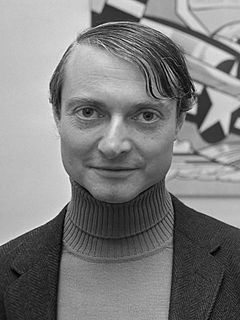
Roy Fox Lichtenstein was an American pop artist. During the 1960s, along with Andy Warhol, Jasper Johns, and James Rosenquist among others, he became a leading figure in the new art movement. His work defined the premise of pop art through parody. Inspired by the comic strip, Lichtenstein produced precise compositions that documented while they parodied, often in a tongue-in-cheek manner. His work was influenced by popular advertising and the comic book style. His artwork was considered to be "disruptive". He described pop art as "not 'American' painting but actually industrial painting". His paintings were exhibited at the Leo Castelli Gallery in New York City.

Dame Jocelyn Barbara Hepworth was an English artist and sculptor. Her work exemplifies Modernism and in particular modern sculpture. Along with artists such as Ben Nicholson and Naum Gabo, Hepworth was a leading figure in the colony of artists who resided in St Ives during the Second World War.
Marc Quinn is a British contemporary visual artist whose work includes sculpture, installation, and painting. Quinn explores "what it is to be human in the world today" through subjects including the body, genetics, identity, environment, and the media. His work has used materials that vary widely, from blood, bread and flowers, to marble and stainless steel. Quinn has been the subject of solo exhibitions at Sir John Soane's Museum, the Tate Gallery, National Portrait Gallery, Fondation Beyeler, Fondazione Prada, and South London Gallery. The artist was a notable member of the Young British Artists movement.
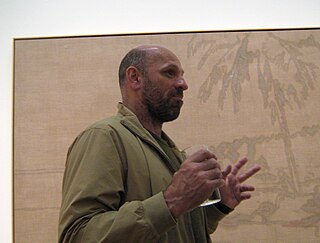
Peter Doig is a Scottish painter. One of the most renowned living figurative painters, he has settled in Trinidad since 2002. In 2007, his painting White Canoe sold at Sotheby's for $11.3 million, then an auction record for a living European artist. In February 2013, his painting, The Architect's Home in the Ravine, sold for $12 million at a London auction. Art critic Jonathan Jones said about him: "Amid all the nonsense, impostors, rhetorical bullshit and sheer trash that pass for art in the 21st century, Doig is a jewel of genuine imagination, sincere work and humble creativity."

Sir Peter Thomas Blake is an English pop artist. He co-created the sleeve design for the Beatles' album Sgt. Pepper's Lonely Hearts Club Band. His other works include the covers for two of The Who's albums, the cover of the Band Aid single "Do They Know It's Christmas?", and the Live Aid concert poster. Blake also designed the 2012 Brit Award statuette.

Sir Jacob Epstein was an American-British sculptor who helped pioneer modern sculpture. He was born in the United States, and moved to Europe in 1902, becoming a British subject in 1911. He often produced controversial works which challenged ideas on what was appropriate subject matter for public artworks. He also made paintings and drawings, and often exhibited his work.

Chelsea College of Arts is a constituent college of the University of the Arts London based in London, United Kingdom, and is a leading British art and design institution with an international reputation.
Allen Jones is a British pop artist best known for his paintings, sculptures, and lithography. He was awarded the Prix des Jeunes Artistes at the 1963 Paris Biennale. He is a Senior Academician at the Royal Academy of Arts. In 2017 he returned to his home town to receive the award Honorary Doctor of Arts from Southampton Solent University

Sir Eduardo Luigi Paolozzi was a Scottish artist, known for his sculpture and graphic works. He is widely considered to be one of the pioneers of pop art.
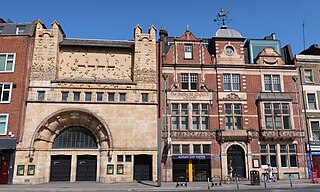
The Whitechapel Gallery is a public art gallery in Whitechapel on the north side of Whitechapel High Street, in the London Borough of Tower Hamlets. The original building, designed by Charles Harrison Townsend, opened in 1901 as one of the first publicly funded galleries for temporary exhibitions in London. The building is a notable example of the British Modern Style. In 2009 the gallery approximately doubled in size by incorporating the adjacent former Passmore Edwards library building. It exhibits the work of contemporary artists and organizes retrospective exhibitions and other art shows.
Peter Phillips is an English artist. His work ranges from conventional oils on canvas to multi-media compositions and collages to sculptures and architecture.

Prunella Clough was a prominent British artist. She is known mostly for her paintings, though she also made prints and created assemblages of collected objects. She was awarded the Jerwood Prize for painting, and received a retrospective exhibition at Tate Britain.
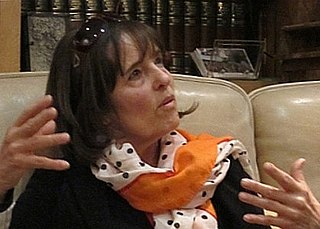
Jann Haworth is a British-American pop artist. A pioneer of soft sculpture, she is best known as the co-creator of The Beatles' Sgt. Pepper's Lonely Hearts Club Band album cover. Haworth is also an advocate for feminist rights especially for the representation of women in the art world.
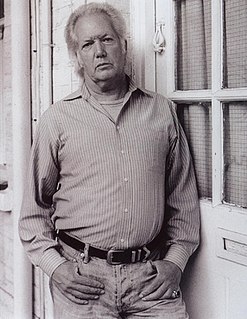
Clive Barker is a British pop artist. His work is present in private and museum collections including the Tate in London, the British Museum in London, the National Portrait Gallery in London, the Victoria and Albert museum in London, the Wolverhampton Art Gallery in Wolverhampton, the Museum für Moderne Kunst in Frankfurt, Städtische Kunsthalle Mannheim, the National Gallery of South Australia in Adelaide, the Berardo Collection Museum in Lisbon, the Philadelphia Museum of Art and the Hirshhorn Museum and Sculpture Garden in Washington, D.C.
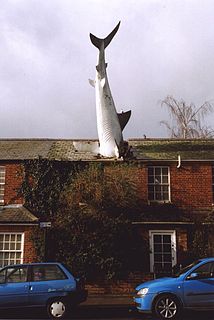
John Buckley is an English sculptor whose best known work is the sculpture "Untitled 1986", better known as "the Shark House" or "The Headington Shark" in Headington, a suburb of Oxford.

Alexander Munro was a British sculptor of the Pre-Raphaelite movement. He concentrated on portraiture and statues, but is best known for his Rossetti-influenced figure-group Paolo and Francesca (1852), which has often been identified as the epitome of Pre-Raphaelite sculpture.
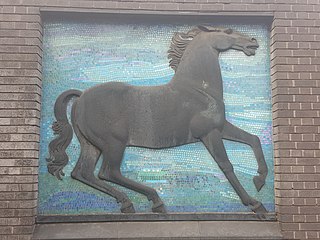
David Bernard McFall was a Scottish sculptor.
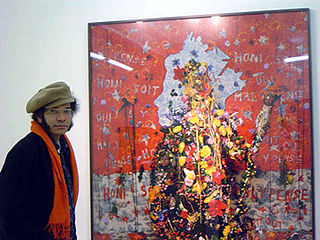
Hew Donald Joseph Locke is a British sculptor and contemporary visual artist based in Brixton, London. In 2000 he won a Paul Hamlyn Award and the EASTinternational Award.

A statue of King Kong by Nicholas Monro was commissioned in 1972 for display in Manzoni Gardens in The Bull Ring, in the centre of Birmingham, England. It was later displayed elsewhere in Birmingham, then at markets in Edinburgh, Penrith, at the Henry Moore Institute in Leeds, and now in the owner's garden in Cumbria.

Hatstand, Table and Chair are a group of three erotic sculptures by British pop artist Allen Jones, created in 1969 and first exhibited in 1970. They have been described in retrospect as "emblematic of the spirit of the 1960s" and an "international sensation." At the time they were met with angry protests, particularly from feminists who saw them as an objectification of women.

















